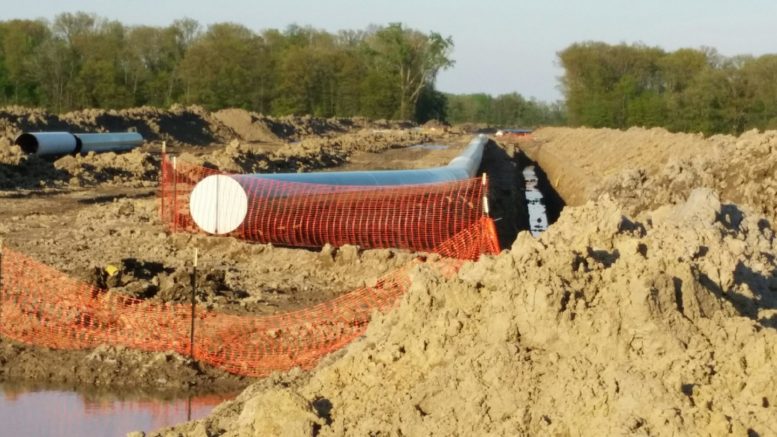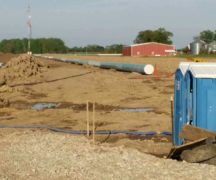By JAN LARSON McLAUGHLIN
BG Independent News
Pipeline tax revenue has started flowing into Wood County coffers.
After much skepticism – some fueled by exaggerated tax estimates from pipeline officials themselves – the property tax payments from the Rover Pipeline project have been made to the county. And soon that money will be on its way to local schools, libraries, townships and other governmental entities.
Rover Pipeline has paid a full year of property taxes in Wood County – adding up to $4.2 million, Wood County Auditor Matt Oestreich said on Tuesday.
School districts will get nearly $2.7 million, county agencies will get $1 million, townships will take in $422,557, and local libraries will get $65,565.
Rover Pipeline, with $57.5 million in property value, has now outpaced Toledo Edison.
“They’ve become the most valuable single taxpayer in the county,” Oestreich said.
And by next year, a second side-by-side Rover pipeline should be in operation – potentially doubling the tax revenue, the county auditor said.
Oestreich said the hesitancy by school districts and other entities to bank on the pipeline is reasonable.
“Schools are all waiting,” he said.
Rover pipeline did not appeal its tax bill this year, but that right to appeal is offered annually, Oestreich said.
“They can appeal next year, potentially they can do that every year,” he said.
Oestreich said utilities do sometimes appeal, most recently Troy Energy located in Troy Township.
The pipeline will continue to pay local property taxes throughout a 30-year depreciation cycle.
The tax revenue coming in from the pipeline will lower the rates for others paying in the county. “That’s a positive for normal residential taxpayers,” said Karen Young, of the county auditor’s office.
Much of the skepticism with Rover’s tax payments was due to the company’s exaggerated estimates of how much local entities would reap from the pipeline coming through the area.
Some of those estimates, made when trying to woo support from local entities, went as high as $3 million a year for entities like Henry Township. However, that township will actually get $143,245 this next year.
In 2015, when the initial promise was made by Energy Transfer which constructed the Rover pipeline, then Wood County Auditor Michael Sibbersen questioned the estimates.
Current county auditor Oestreich shared those concerns about inaccurate estimates being given to township officials.
“They were throwing around some rather large numbers,” Oestreich said. “I don’t think they understood Ohio taxation at all.”
Following is a list of the annual Rover tax revenue going to each entity this year:
Schools: $2,698,811 total
- Elmwood: $1,224,904.
- North Baltimore: $422,659.
- McComb: $40,186.
- Bowling Green: $831,206.
- Penta: $179,855.
Townships: $422,557 total
- Bloom: $109,599.
- Henry: 143,245.
- Jackson: $39,062.
- Milton: $77,664.
- Perry: $52,985.
Libraries: $65,565 total
- Wayne: $33,467.
- North Baltimore: $15,941.
- Wood County: $16,156.
Wood County public agencies are also in line to get tax revenue from the Rover pipeline. The following agencies will divide nearly $1 million in Rover tax revenue:
- Wood County Park District: $57,482.
- Wood County Developmental Disabilities: $525,961.
- Wood County General Fund: $135,082.
- Wood County Historical Center: $2,874.
- Wood County Job & Family Services: $74,726.
- Wood County Alcohol, Drug Addiction and Mental Health Services: $149,453.
- Wood County Senior Citizens: $40,237.
- Wood County Health Department: $28,741.
None of the new Nexus pipeline running north of Bowling Green is located in the Bowling Green School District. The school district had delayed putting the Rover pipeline revenue in its budget, since it was unknown whether or not the funding would come through.
The district’s financial advisor, David Conley, from Rockmill Financial Inc., also pointed out that the pipeline revenue is an uncertainty since the state sometimes takes that revenue from some districts to give to others that are struggling financially.
“They siphon it off and send it someplace else,” he said.
“Lobbyists are being paid a lot of money to take money away from you,” he said last week. “You’re on the radar as a rich district.”



